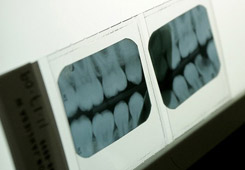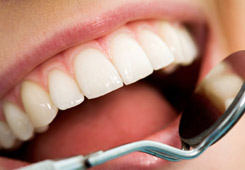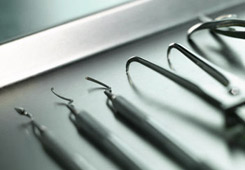| |
Oral Health Questions
Click question for the answer
Any information given here is not a substitute for a visit to your regular doctor.
BLEEDING GUMS
- Bleeding gums are not normal and should not be ignored. It is a sign of disease.
- Bleeding is caused by the plaque left from improper brushing and flossing.
- Germs in plaque are alive. The products they let off are toxins and acids.
- Toxins cause ulcerations that bleed under gums.
- Brushing and flossing ulcerated gums is like pulling off a scab. The area bleeds.
- Bacteria in the area can enter the blood stream.
- Plaque can get caught in the blood stream causing blood clots that lead to heart attacks and stokes.
- Keep bleeding areas clean so they can heal.
- Infected gums can lead to bone loss and loss of teeth.
- Health deteriorates without teeth.
Back to top
WHAT MAKES A TOOTH ACHE?
- The outside of a tooth is called enamel.
- It is the hardest part of the body and porous.
- Sticky stuff that accumulates on teeth each day is plaque.
- Plaque produces acids that seep into pores, breaking down enamel.
- Left untreated, enamel gets a cavity and needs to be repaired by a dentist.
- Cavities can get large enough to penetrate the inside of the tooth where the nerve and blood vessel are located.
- Cavities need to be treated prior to hurting before getting close to the nerve, causing a tooth ache.
- Cavities too far gone that hurt when you bite or chew, might indicate an infection at the bottom of the root.
- Infected teeth can be harmful to over-all health.
- Infection can be picked up by the blood stream and new diseases start.
Back to top
WHY ARE MY TEETH SENSITIVE TO HOT, COLD & AIR?
- The outside of a tooth is called enamel.
- Brushing too hard can cause enamel to wear away.
- Biting forces can cause small pieces of enamel to break away at the gum line exposing the root.
- Grinding teeth while you sleep flexes teeth, wearing and chipping them.
- Aging and genetics can cause receding gums making roots sensitive.
- These examples expose tubules leading to the nerve in the middle of the tooth.
- The nerve sends signals to the brain alerting us to a problem.
- Avoid sensitivity by using a soft brush and carefully chew hard foods such as seeds, nuts and hard candies.
- If you grind your teeth, ask your dental professional about a night guard. This is a custom-made plastic covering to wear over teeth while you sleep. You grind on the plastic rather than teeth.
- There are rinses and toothpastes that can help alleviate sensitive teeth. Ask your hygienist for recommendations.
Back to top
WHY DO WE GET CAVITIES?
- Each day teeth get a sticky substance covering them.
- The substance is composed of saliva, small food particles and bacteria.
- It is called plaque.
- Proper brushing and flossing removes plaque.
- When plaque is not removed, the bacteria in plaque release toxins and acids.
- The acid starts breaking down the tooth.
- Cavities can occur on any surface of the tooth, including around receding gums, existing fillings, under crowns and around braces.
Back to top
DO MY CHILDREN NEED SEALANTS?
- Yes, this is one of the best gifts that you can give your child.
- Sealants should be placed on a child’s first permanent molars, which is about the age of 6.
- Then at about the age of 12, the next set of molars should be sealed.
- Sealants are an acrylic-like material that helps seal out bacteria.
- Sealant material flows into depressions and grooves of the back teeth.
- First the tooth is cleaned; a gentle acid solution is applied to prepare the tooth to hold the sealant material. After the tooth is rinsed and dried, sealant material is applied. A special light causes a chemical reaction to turn the sealant from liquid to solid.
- Sealants can last for a number of years. They should be checked at each dental appointment and replace if missing.
Back to top
WHAT IS CALCULUS?
- Calculus is the daily buildup of plaque that has not been properly brushed away.
- Plaque is a combination of saliva, small food particles and bacteria.
- It calcifies on teeth, crowns, bridges, partials and dentures.
- It is a hard substance that needs to be removed by your dental hygienist.
- Calculus contributes to gum disease called periodontitis.
- Calculus serves as a breeding ground for more bacteria.
- Calculus left on teeth will cause gum disease, loss of bone and teeth.
Back to top
BAD BREATH AND WHITE TONGUES
- The tongue should be pink, not white-coated.
- A white-coated tongue is usually a sign of bacteria colonies.
- Bacteria are alive in the mouth. They mature in 24 hours.
- Bacteria are microscopic and can get in all the crevices in your mouth.
- The tongue is made up of thousands of hairs.
- Bacteria can get in-between the hairs and emit offending odors.
- Brush your tongue daily from back to front.
If cleaning does not work, see your medical doctor for further digestive tests.
Back to top
SHOULD I FLOSS BEFORE OR AFTER BRUSHING
- Either way is acceptable.
- The main thing is to floss at least once every 24 hours.
- There are over 600+ different kinds of bacteria in the mouth.
- Bacteria mature in 24 hours.
- Flossing helps remove the bacteria and food particles that cause teeth to break down.
Back to top
HOW OFTEN SHOULD I VISIT MY HYGIENIST AND HOW OFTEN FOR X-RAYS?
- Depending on your oral health, it is best to visit your hygienist two times a year.
- Persons with gum disease and are prone to cavities should visit 3-4 times a year.
- X-rays are taken yearly if you are prone to cavities and gum disease.
- If you are not prone to cavities, then every 18 to 24 months for x-rays.
- Your dental professional will discuss how often to get teeth cleaned and when to take x-rays.
- If you are not due for x-rays and have a tooth ache, one x-ray will be taken of that tooth.
Back to top
WHAT SHOULD I EXPECT AT MY DENTAL VISIT?
- Health history review, note any surgeries and medications.
- Review any oral health problems and history.
- Pre/post antimicrobial rinse.
- Exam and charting of any previous dental work performed.
- Chart entire mouth of pocket depths around each tooth.
- Chart amount of plaque, bleeding, recession, appearance of tissue.
- X-rays, as needed.
- Oral cancer screening.
- Exam by dentist to determine dental needs and treatment schedule.
- Discuss with patient recommendations from dentist.
- Dental cleaning.
- Oral health instructions, recommended products.
- Every office is different in appointment scheduling.
- If you need deep cleaning, you will be scheduled for several appointments.
Always ask for a licensed, registered dental hygienist (RDH) to clean your teeth.
Back to top
DO YOU HAVE DIABETES?
- Gum disease is a common complication of diabetes.
- Untreated gum disease makes it harder for patients with diabetes to control blood sugar.
- Sore, bleeding gums are more difficult to heal with diabetes.
- Try to get morning appointments, take insulin as directed by your MD and be sure to eat before your appointment.
- Persons with uncontrolled diabetes are prone to infection, poor healing, increased incidence and severity of periodontal disease and burning mouth syndrome.
Back to top
DO YOU SMOKE?
- Smoking Tobacco is the most significant risk factor for advancing gum disease.
- Smoking adds to coronary heart disease.
- Smoking will increase calculus.
- Smoking and smokeless tobacco causes oral cancer, recession and root exposure.
- Brown stain occurs most frequently on lingual (back side of your teeth) surfaces.
- Teeth tend to turn brown over time.
Back to top
HAVE YOU HAD HEAD, NECK OR ORAL CANCER?
- Cancer can be caused from drinking alcohol and smoking products.
- Three forms of oral cancer treatment are: surgery, radiation and chemotherapy.
- Results of radiation can be: inflammation of the tissue, dry mouth, saliva may become thick and sticky, lips may crack and there may be difficulty in speaking, swallowing and eating. Food particles may cling to teeth and gums.
- Dry mouth may cause an increase in cavities. There are products that will help keep the mouth moist. They can be found in the mouth rinse section.
- Chemotherapy can produce loss of appetite, nausea, vomiting, diarrhea, oral lesions, sore mouth and this affects health and nutritional states.
- Taste can be altered by degeneration of taste buds from chemotherapy.
- Interest in eating diminishes due to sore mouth, dry throat, loss of taste sensation and less saliva.
- Fewer side affects occur when optimal oral health care is maintained.
- All dental work and cleanings should be performed before cancer treatments.
- Fluoride rinses and fluoride gel trays are recommended while receiving radiation therapy.
- A dental professional can recommend products.
Back to top
|
|



